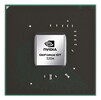NVIDIA GeForce GT 525M vs NVIDIA GeForce GT 540M vs NVIDIA GeForce GT 520MX
NVIDIA GeForce GT 525M
► remove from comparisonThe NVIDIA GeForce GT 525M is a relatively fast mid-range laptop graphics card and the successor to the GeForce GT 425M. It is based on the GF108 core as part of the Fermi architecture. Therefore, it supports DirectX 11 and OpenGL 4.0. Compared to the GT 425M, core clock rates of the GT 525M have been increased by about 7 percent.
GF108 architecture
The GF108 core of the GT 525M is related to the GF100 core found in the GeFore GTX 480M and offers 96 shaders and a 128 Bit memory bus for DDR3 VRAM. Except for the memory controllers, the GF108 can essentially be considered a halved GF106. Therefore, the architecture is not directly comparable to the old GT215 (e.g., GeForce GTS 350M) or GT216 (e.g., GeForce GT 330M) cores.
Unlike the GF100, the smaller GF104, GF106, and GF108 cores were not only shortened, but also considerably modified. In contrast to the GF100, which was designed for professional applications, these latter chips target the consumer market. They feature more shaders (3x16 instead of 2x16), more texture units (8 instead of 4) and more SFUs per streaming multi-processor (SM). As there are still only 2 warp schedulers (versus 3 shader groups), Nvidia now uses superscalar execution in order to utilize the higher amount of shaders per SM more efficiently. In theory, the performance per core should be greatly improved over previous generations.
In worst case scenarios, the performance of the Fermi architecture can also be worse than expected. The ECC memory protection, which is important for professional applications, was completely omitted and the FP64 hardware was shortened (only 1/3 of the shader are FP64-capable and thereby only 1/12 of the FP32’s performance). Because of these cutbacks, the size of the SM grew only by 25% despite the higher number of shaders and larger warp schedulers with superscalar dispatch capabilities.
Due to the different shader architectures and the higher clock rate of the shader domain, the core count of Nvidia Fermi cards can not be directly compared to AMD cores of the Radeon 5000 series (e.g. HD 5650).
Detailed information on the GF104 architecture (and by extension the GF106 and GF108) can be found in the desktop GTX 460 article by Anandtech.
Performance
The gaming performance of the GT 525M is similar to the GT 425M as the core clock rate differs only by 7%. Therefore, the gaming performance of the GT 525M is sufficient for medium detail settings in modern games like Battlefield Bad Company 2. Less demanding games should run in high detail settings. The best resolution to choose is 720p or lower due to the limited performance. Benchmarks and comparison charts on the 3D performance can be found below or on The dedicated GT 425M benchmarks page is a great source as well due to the similarity between both GPUs.
Features
A novelty of the GF104/106/108 chips is the support for Bitstream HD Audio (Blu-Ray) output via HDMI. Similar to the Radeon HD 5730, the GT 525M can transfer Dolby True HD and DTS-HD bitstream without quality loss to a HiFi receiver.
The GT525M offers the PureVideo HD technology for video decoding. The included Video Processor 4 (VP4) supports feature set C and allows the GPU to fully decode MPEG-1, MPEG-2, MPEG-4 Part 2 (MPEG-4 ASP - e.g., DivX or Xvid), VC-1/WMV9, and H.264 (VLD, IDCT, Motion Compensation, and Deblocking).
Furthermore, the GPU is able to decode two 1080p streams simultaneously (e.g. for Blu-Ray Picture-in-Picture).
Through CUDA, OpenCL and DirectCompute 2.1 support, the GeForce GT 525M can be of help in general calculations. For example, the stream processor can encode videos considerably faster than can a modern CPU. Furthermore, physics calculations can be done by the GPU using PhysX (e.g., supported by Mafia 2 or Metro 2033).
According to Nvidia, the 525M includes support for 3D Vision. This enables the laptop to send 3D content (3D games, 3D Web Streaming, 3D photos, 3D Blu-Rays) to a built-in 3D-enabled screen or an external 3D TV if supported by the laptop manufacturer. However, this feature is automatically disabled if the laptop includes Optimus.
The power consumption of the GeForce GT 525M should be similar to the GT 425M and is therefore suited for 15” laptops. Furthermore, the 500M series supports Optimus to automatically switch between the integrated graphics card from Intel and the Nvidia GPU. The implementation of the Nvidia power-saving feature is completely dependent on the laptop manufacturer.
NVIDIA GeForce GT 540M
► remove from comparisonThe NVIDIA GeForce GT 540M is a fast middle class graphics card for laptops. It is based on the same chip as the GeForce GT 435M but with slightly higher clock speeds. Furthermore, it supports GDDR5 and 900MHz DDR3 graphics memory. Unfortunately, no models have utilized GDDR5 due to the increase in power consumption and higher prices compared to DDR3 VRAM.
GF108 Architecture
The GT 540M is based on the same GF108 architecture as the older GT 435M. The GF108 stems from the GF100 (Fermi) DirectX 10 architecture. However, it is optimized for the consumer end (gaming) and stripped down to save power. More information on the architecture can be found on our GeForce GT 435M page.
Performance
In general, the performance of the 540M lies between the Radeon HD 5650 and 5730 in our first benchmark tests. Therefore, the 540M is about 10% faster than the GT 435M using DDR3 graphics memory.
Paired with a fast CPU, demanding games of 2010 should run fluently in medium to high details and SXGA (1280x1024) resolution. In our tests, for example, Call of Duty: Black Ops and StarCraft 2 ran fluently in high details and 1360x768. More gaming benchmarks can be found below. Demanding games released in 2011 like Anno 2070 or Skyrim will only run fluent in low to medium detail settings.
Features
A novelty of the GF104/106/108 chips is the support for Bitstream HD Audio (Blu-Ray) output via HDMI. Alike the Radeon HD 5730, the GT 540M can transfer Dolby True HD and DTS-HD bitstream without quality loss to a HiFi receiver.
The GT 540M offers PureVideo HD technology for video decoding using the GPU. The integrated Video Processor 4 (VP4) supports feature set C and therefore the GPU is able to fully decode MPEG-1, MPEG-2, MPEG-4 Part 2 (MPEG-4 ASP - e.g., DivX or Xvid), VC-1/WMV9, and H.264 (VLD, IDCT, Motion Compensation, and Deblocking). Furthermore, the GPU is able to decode two 1080p streams simultaneously (e.g. for Blu-Ray Picture-in-Picture).
Through CUDA, OpenCL and DirectCompute 2.1 support, the GeForce GT 540M can be of help in general calculations. For example, the stream processor can encode videos considerably faster than can a modern CPU. Furthermore, physics calculations can be done by the GPU using PhysX (supported by Mafia 2 and Metro 2033). However, the GPU is not fast enough to calculate PhysX high detail game settings.
Following the current 3D trend, the 540M supports 3D Vision. It enables the laptop to send 3D content (3D games, 3D Web Streaming, 3D photos, 3D Blu-Rays) to a built-in 3D-enabled screen or an external 3D TV if supported by the manufacturer. This feature is disabled if the notebook includes Optimus.
The power consumption of the GeForce GT 540M should be similar to the GeForce GT 435M or Radeon HD 5730 and is therefore suited for 15" or larger laptops. Without load, the chip is clocked approximately at 50/101/137 MHz (chip/shader/memory) in 2D mode and 202/405/324 in 3D mode to save power. Furthermore, the 500M series supports Optimus to automatically switch between the integrated graphics card from Intel and the Nvidia GPU. The implementation of the Nvidia graphics switching technology is dependent on the laptop manufacturer.
NVIDIA GeForce GT 520MX
► remove from comparison
The NVIDIA GeForce GT 520MX is an entry level dedicated laptop graphics card presented in 2011. It is based on the GF119 like the GT 520M, but features a higher core and shader clock rate. Using DDR3, the 64 Bit memory bus may become a bottleneck of the graphics card.
Architecture
The GF119 offers 48 ALUs, 8 texture units and a 64 Bit memory interface for DDR3-VRAM. Therefore, it is similar to a half GF108 (GeForce GT 540M) but already manufactured with optimized transistors. As a difference the amount of raster-operation-processors (ROP) stayed the same counting 4. The GF119 is the smalles chip of the Fermi generation and is used for low end laptops.
Performance
As an entry level card, the GT 520MX has to compete against the Intel HD Graphics 3000 in the current Sandy Bridge processors. Due to the higher clock speeds, the MX should be faster than the GT 520M which was only slightly faster than the HD 3000 but clearly still beyond the faster GT 525M. Therefore demanding games like Crysis 2 or Mafia 2 run only in lowest detail and resolutions fluently. Less demanding games lik Fifa 11 or Sims 3 should be playable even in high detail settings.
Features
As the other 500M series chips, the 520MX supports Bitstream HD Audio (Blu-Ray) output via HDMI. That means the card is able to transfer Dolby True HD and DTS-HD bitstream-wise without quality loss to a HiFi receiver.
The GT520MX offers the PureVideo HD technology for video decoding. The included Video Processor 5 (VP5) supports feature set D and therefore the GPU is able to fully decode MPEG-1, MPEG-2, MPEG-4 Part 2 (MPEG-4 ASP - e.g., DivX or Xvid), VC-1/WMV9, and H.264 (VLD, IDCT, Motion Compensation, and Deblocking). Compared to the older VP4, the VP5 offers faster decodes at lower power, HD-to-SD transcodes and 4K x 4K resolution H.264 decode support.
Furthermore, the GPU is able to decode two 1080p streams simultaneously (e.g. for Blu-Ray Picture-in-Picture).
Through CUDA, OpenCL, and DirectCompute 2.1 support, the GeForce GT 520MX can be of help in general calculations. For example, the stream processor can considerably faster encode videos than a fast CPU can. Furthermore, physics calculations can be theoretically done by the GPU using PhysX (e.g. supported by Mafia 2 or Metro 2033) but the performance wont be sufficient for this.
| NVIDIA GeForce GT 525M | NVIDIA GeForce GT 540M | NVIDIA GeForce GT 520MX | |||||||||||||||||||||||||||||||||||||||||||||||||||||||
| GeForce GT 500M Series |
|
|
| ||||||||||||||||||||||||||||||||||||||||||||||||||||||
| Codename | N12P-GE | N12P-GS | N12P-GVR | ||||||||||||||||||||||||||||||||||||||||||||||||||||||
| Architecture | Fermi | Fermi | Fermi | ||||||||||||||||||||||||||||||||||||||||||||||||||||||
| Pipelines | 96 - unified | 96 - unified | 48 - unified | ||||||||||||||||||||||||||||||||||||||||||||||||||||||
| Core Speed | 600 MHz | 672 MHz | 900 MHz | ||||||||||||||||||||||||||||||||||||||||||||||||||||||
| Shader Speed | 1200 MHz | 1344 MHz | 1800 MHz | ||||||||||||||||||||||||||||||||||||||||||||||||||||||
| Memory Speed | 900 MHz | 900 MHz | 900 MHz | ||||||||||||||||||||||||||||||||||||||||||||||||||||||
| Memory Bus Width | 128 Bit | 128 Bit | 64 Bit | ||||||||||||||||||||||||||||||||||||||||||||||||||||||
| Memory Type | GDDR5, DDR3 | GDDR5, DDR3 | DDR3 | ||||||||||||||||||||||||||||||||||||||||||||||||||||||
| Max. Amount of Memory | 1536 MB | 1536 MB | 1024 MB | ||||||||||||||||||||||||||||||||||||||||||||||||||||||
| Shared Memory | no | no | no | ||||||||||||||||||||||||||||||||||||||||||||||||||||||
| API | DirectX 11, Shader 5.0 | DirectX 11, Shader 5.0 | DirectX 11, Shader 5.0 | ||||||||||||||||||||||||||||||||||||||||||||||||||||||
| Power Consumption | 25 Watt | 35 Watt | |||||||||||||||||||||||||||||||||||||||||||||||||||||||
| technology | 40 nm | 40 nm | 40 nm | ||||||||||||||||||||||||||||||||||||||||||||||||||||||
| Notebook Size | medium sized | large | |||||||||||||||||||||||||||||||||||||||||||||||||||||||
| Date of Announcement | 06.01.2011 | 06.01.2011 | 30.05.2011 | ||||||||||||||||||||||||||||||||||||||||||||||||||||||
| Features | Optimus Support, PureVideo HD VP4, 3D Vision, 3DTV Play, Bitstream HD Audio, CUDA, DirectCompute, OpenCL, OpenGL 4.0, DirectX 11 | Verde Drivers, CUDA, Optimus, DirectCompute, OpenCL, DirectX11, OpenGL 4.1 |
Benchmarks
3DM Vant. Perf. total + NVIDIA GeForce GT 525M
specvp11 snx-01 + NVIDIA GeForce GT 525M
Average Benchmarks NVIDIA GeForce GT 525M → 100% n=12
Average Benchmarks NVIDIA GeForce GT 540M → 110% n=12
Average Benchmarks NVIDIA GeForce GT 520MX → 79% n=12
* Smaller numbers mean a higher performance
1 This benchmark is not used for the average calculation
Game Benchmarks
The following benchmarks stem from our benchmarks of review laptops. The performance depends on the used graphics memory, clock rate, processor, system settings, drivers, and operating systems. So the results don't have to be representative for all laptops with this GPU. For detailed information on the benchmark results, click on the fps number.

Dishonored
2012
World of Tanks v8
2012
Fifa 13
2012
F1 2012
2012
Borderlands 2
2012
Counter-Strike: GO
2012
Darksiders II
2012
Sleeping Dogs
2012
Risen 2: Dark Waters
2012
Mass Effect 3
2012
Anno 2070
2011
Battlefield 3
2011
Fifa 12
2011
F1 2011
2011
Dirt 3
2011
Crysis 2
2011
Fifa 11
2010
Mafia 2
2010
StarCraft 2
2010
Metro 2033
2010
CoD Modern Warfare 2
2009Average Gaming NVIDIA GeForce GT 525M → 100%
Average Gaming 30-70 fps → 100%
Average Gaming NVIDIA GeForce GT 540M → 112%
Average Gaming 30-70 fps → 114%
Average Gaming NVIDIA GeForce GT 520MX → 95%
Average Gaming 30-70 fps → 92%
| NVIDIA GeForce GT 525M | NVIDIA GeForce GT 540M | NVIDIA GeForce GT 520MX | |||||||||||||||||||
|---|---|---|---|---|---|---|---|---|---|---|---|---|---|---|---|---|---|---|---|---|---|
| low | med. | high | ultra | QHD | 4K | low | med. | high | ultra | QHD | 4K | low | med. | high | ultra | QHD | 4K | ||||
| Dishonored | 13.8 | 15.4 | 15.2 | ||||||||||||||||||
| World of Tanks v8 | 42.6 | 15.1 | 13 | ||||||||||||||||||
| Fifa 13 | 146 | 97 | 52 | ||||||||||||||||||
| F1 2012 | 39 | 34 | 30 | ||||||||||||||||||
| Borderlands 2 | 33 | 25.3 | 20 | ||||||||||||||||||
| Torchlight 2 | 24.3 | 12.6 | |||||||||||||||||||
| Counter-Strike: GO | 75 | 68 | 38 | ||||||||||||||||||
| Darksiders II | 26.8 | ||||||||||||||||||||
| Sleeping Dogs | 41 | 30.1 | 10.3 | ||||||||||||||||||
| Risen 2: Dark Waters | 20.8 | 14 | 10.8 | ||||||||||||||||||
| Mass Effect 3 | 36.1 | 25.1 | |||||||||||||||||||
| Anno 2070 | 81 | 33 | 20 | 9.6 | 55 | 21 | 13 | ||||||||||||||
| The Elder Scrolls V: Skyrim | 41 | 28 | 19 | 12 | 31 | 22 | 15 | ||||||||||||||
| Battlefield 3 | 36 | 23 | 18 | 11.8 | 10.5 | ||||||||||||||||
| Fifa 12 | 248.1 | 137.1 | 107 | 67 | 218 | 107 | 86 | ||||||||||||||
| F1 2011 | 87 | 64 | 45 | 18 | 66 | 47 | 27 | ||||||||||||||
| Deus Ex Human Revolution | 83 | 37 | 62.6 | 26.3 | |||||||||||||||||
| Dirt 3 | 97 | 41 | 25 | 100 | 51 | 34 | 14 | 101.2 | 41.4 | 27 | |||||||||||
| Call of Duty: Black Ops | 65 | 49 | 41 | 23 | 68 | 56 | 44 | 28 | 62.6 | 40.6 | |||||||||||
| Battlefield: Bad Company 2 | 45 | 35 | 26 | 14 | 57 | 43 | 31 | 16 | 41 | 31 | 22 | ||||||||||
| Crysis - GPU Benchmark | 109 | 54 | 30 | 6.9 | 21.6 | ||||||||||||||||
| NVIDIA GeForce GT 525M | NVIDIA GeForce GT 540M | NVIDIA GeForce GT 520MX | |||||||||||||||||||
| low | med. | high | ultra | QHD | 4K | low | med. | high | ultra | QHD | 4K | low | med. | high | ultra | QHD | 4K | < 30 fps < 60 fps < 120 fps ≥ 120 fps | 1 2 | 3 | 2 1 | 2 | | | < 30 fps < 60 fps < 120 fps ≥ 120 fps | 3 6 1 | 2 5 1 1 | 3 6 1 | 7 1 | | | < 30 fps < 60 fps < 120 fps ≥ 120 fps | 4 8 5 2 | 9 6 3 | 13 3 1 | | | |
For more games that might be playable and a list of all games and graphics cards visit our Gaming List














































